Dell XPS 15 Haswell Edition: QHD+ with a Refined Design
by Jarred Walton on March 6, 2014 7:00 AM ESTDell XPS 15: General Performance
With all the talk of potential throttling, some of you might be concerned with general performance – and again, let me reiterate that a reboot appears to clear the problem, so hopefully Dell’s engineering time can track down the root cause in the coming days/weeks and fix it. Even if they can’t/don’t, the reality is that in most cases the throttling is a complete non-issue. PCMark and other tests that hit the CPU never showed any problems, and even most of the other graphics testing that I ran didn’t have problems. Of course, with a reboot apparently being a workaround, that’s not too surprising.
As you would expect from the hardware, the high-end model of the XPS 15 that we’re testing runs plenty fast and should satisfy anyone short of extreme performance types. If you want more CPU power in a laptop, you’ll basically need to get something quite a bit thicker and heavier, and even then the top model i7-4930MX/4940MX are only about 25% faster in practice (4.0GHz maximum Turbo Boost vs. 3.2GHz). The 512GB SSD also helps keep things running smoothly, 16GB RAM should be sufficient for quite some time (outside of perhaps running lots of VMs or a few other specific workloads), and when needed the GT 750M is waiting in the background to help with graphics/compute tasks. Here’s a look at our general performance testing results, which have been updated to use the latest versions of 3DMark11, 3DMark (2013), PCMark7, and PCMark8 along with Cinebench 11.5 and x264 HD 5. PCMark8 v2 scores are not (entirely) comparable with the earlier release, so for now we only have this one system tested, but that will change in time.
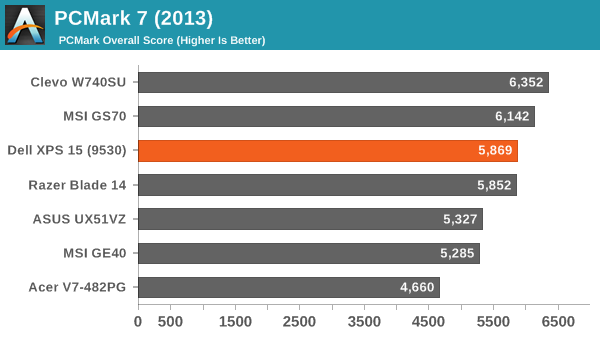
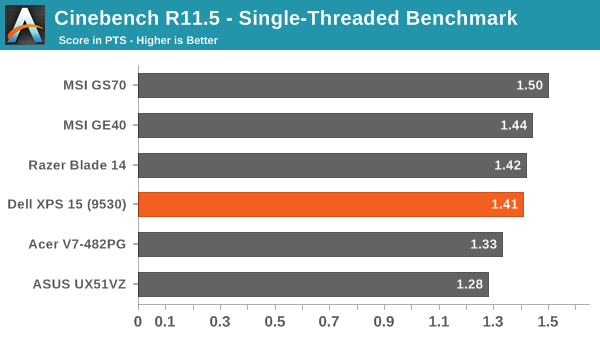
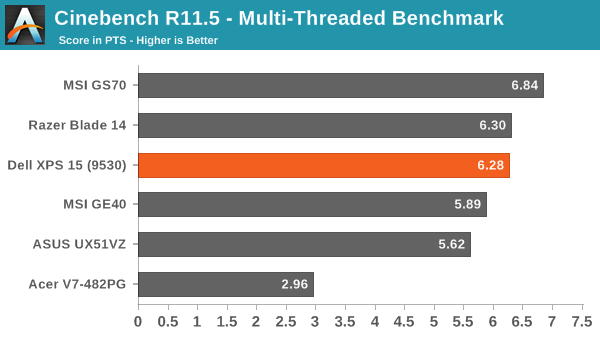
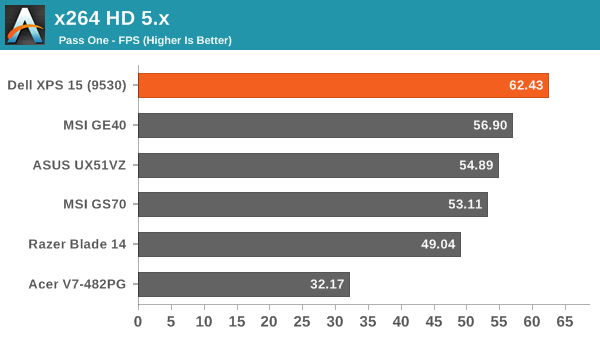
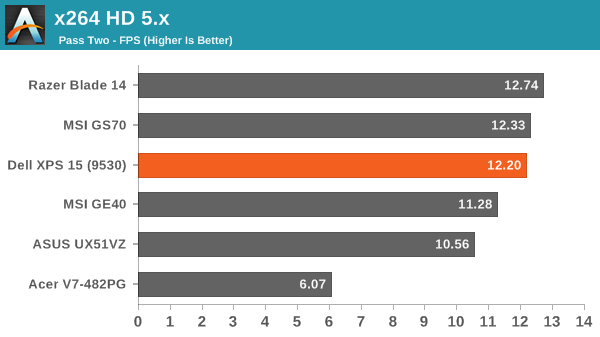
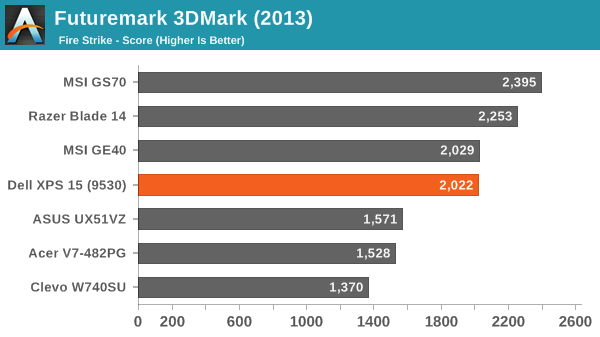
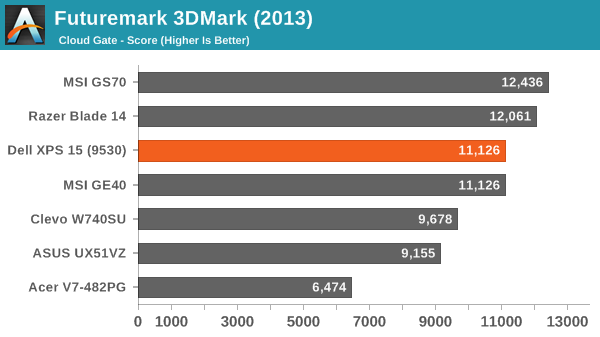
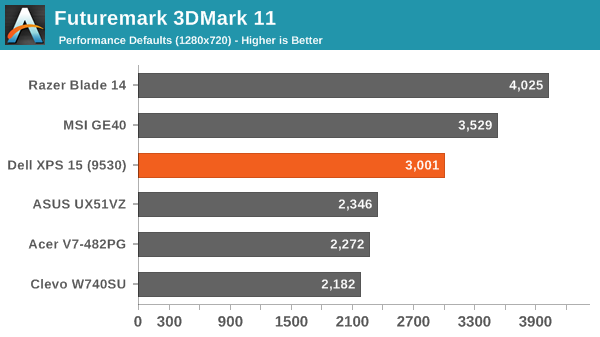
There’s really not much to say about overall performance. The new Dell XPS 15 may not be the absolute fastest laptop around, but it’s certainly a capable offering that can handle any reasonable load most users might want to run. If you need more performance, you likely knew before even looking at these graphs that that would be the case. As a premium consumer/business laptop, I know plenty of people that would be quite please to have one of these to tote around.










152 Comments
View All Comments
darwinosx - Thursday, March 6, 2014 - link
You could not play me to buy Dell anything. Cheap junk and forget about support after you buy.kgh00007 - Thursday, March 6, 2014 - link
How about the WiFi performance?The previous version had poor connection and throughput issues due to a design fault? Is this one any better?
My XPS 15 L502x, which is two generations behind this one, has the exact same throttling issues. I would not buyba laptop with any sign of throttling issues from the start, it will only get worse over time. Look for a laptop with good thermals from the start.
In order to game on my L502x with an i7-2360QM and GT525M, I have to set a "Game" profile with the CPU Max set to 99% to avoid turbo boost on the CPU so that it doesn't cook itself and the GPU. The heatsinks are connected just like they are in this newer model!
jphughan - Thursday, March 6, 2014 - link
WiFi had some issues early on in this system but they turned out to be driver-related. Intel released version 16.6 that seems to have fixed the vast majority of problems. Some people on NotebookReview are still having issues, but they haven't clarified what router or firmware they're running, so I consider those issues within the regular realm of WiFi performance/compatibility issues overall and not something specific to this particular system.dorekk - Monday, June 23, 2014 - link
That's weird, I've never noticed any throttling with my L502X.Dug - Thursday, March 6, 2014 - link
I've read that people have been very happy with the business equivalent which is the Dell Precision M3800. No throttling and seems to run cooler. I'm assuming because it uses the Nvidia Quadro K1100M, w/ 2GB GDDR5. I personally would get the 1080p panel. The scaling with high resolution displays is fine, until you plug in external monitors. Yes you can have different scaling between the laptop and external monitors but it's never plug and play. As soon as you disconnect them, you have to log off and back in to get the correct scaling on the laptop.jphughan - Thursday, March 6, 2014 - link
Or just take the acquisition of this laptop with a QHD+ panel as an excuse to buy a 4K panel! :D Of course that won't help if your apps don't handle scaling well at all as opposed to just having issues with regular DPI and HiDPI coexisting.I have the QHD+ version with a 24" 1200p external display and work around it by either not running the built-in panel at all when at my desk or running it at 1600x900. Yes switching to 3200x1800 and adjusting scaling requires a logoff and logon, which is somewhat irritating, but that's mostly because Microsoft only just delivered an API in Windows 8.1 that notifies applications when there's been a DPI scaling change, and thus those app developers haven't updated their apps to watch for and respond to that API notification. Remember back in Windows 95 when you had to restart your machine even when you changed your desktop resolution? That was true for the same reason, and it's been fixed because applications now watch for and respond to the resolution change notification. The same will happen with DPI scaling.
typicalGeek - Thursday, March 6, 2014 - link
After all the problems my kid has had with his XPS 15 (i5 - don't know exact model) in the 2.5 years he's had it, I would be pretty hard pressed to even consider one.The expensive "Crystal Clear HD" (or some such marketing BS) screen is useless unless viewed "head on" - only a few degrees off in either axis are unviewable, he's had problems with Dell's drivers (for the touchpad & DVD drive), and the 90W battery died without any warning. Still shows 100% charge on the status LEDs. Ha! Dell wanted $150 for a replacement battery, he ended up ordering one off Amazon for less than a third of that - and it included a 18 month warranty. Now his XPS keeps bugging him every start/boot that his battery is not genuine and that he should replace it. Does Dell <i><b>really</b></i> think they're going to convince someone to spend three times as much to get their battery by nagging them every day? All it really does is slow the boot process and tick off the customer. (Who probably isn't too keen that their battery didn't last much past the warranty in the first place.)
JBVertexx - Thursday, March 6, 2014 - link
My biggest beef with Dell now is their website and move to pre-configured models. It used to be so easy to go on the website and pick exactly what I wanted. I've tried numerous times in the last 4 months to go find something I would like, and it's just not there.There are too many models with too few options. The navigation is confusing, and there is no straightforward way to see ALL the models for a particular line you want.
I have a 4 year old Dell Latitude E6410, which was maxed out with the specs when I bought it. I've been happy with Dell laptops as my primary work and do-everything PC since I started buying them 16 years ago.
So instead of buying a new laptop, I just replaced my HDD with a 240GB SSD, then I bought one of the ODD bay adapters off ebay to fit a 750GB storage drive, and I'm all set for now. I'm starting to get in the hurt-locker with my NVS1100 graphics, and I'm starting to find cases where I could use more than 8GB RAM, but I guess I'll just have to suck it up for a while longer.
Really disappointed in what the website and their product lineup have become.
JBVertexx - Thursday, March 6, 2014 - link
Correction - that's NVS 3100M - still in the hurt-locker though.jphughan - Thursday, March 6, 2014 - link
Unfortunately pre-configured SKUs is the new deal. I think it's because in this smartphone/tablet era people overall are less concerned with menial options and more concerned with the overall product. That's not true of everyone of course, but fixed SKUs while continuing to only build to order means savings from a lean inventory and additional savings from fewer manufacturing variances and thus fewer chances of errors and rework.Still, Dell does appear to be passing the savings down to the consumer (likely because consumers are demanding lower prices for what is being seen more and more as a commodity/luxury than a necessity in the smartphone/tablet era). I remember my maxed out Precision M6300 back in the day cost $5200 before discounts. The modern-day equivalent of that system is the Precision M90, and even maxed out it costs less than half that -- despite inflation over the last 7 years. And it's certainly not because the Precision line has gone down the tubes.